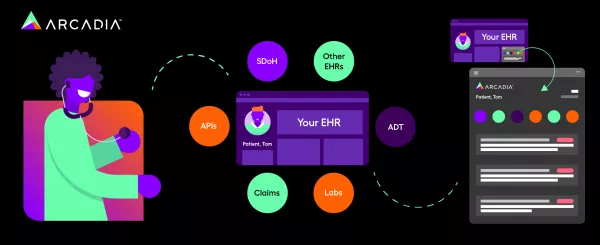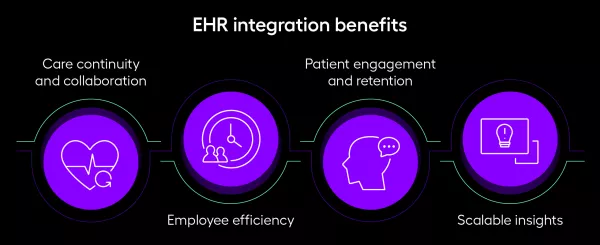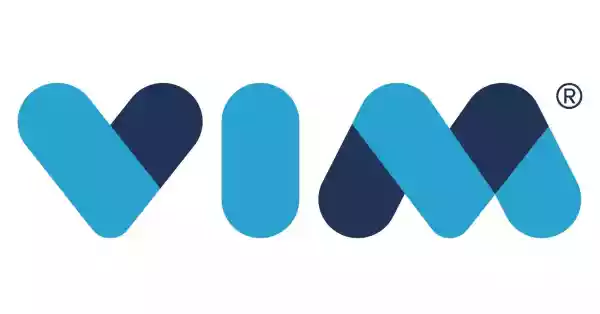How EHR integration streamlines healthcare operations
The Electronic Health Record (EHR) market is overflowing with millions of detailed records in real-time, and it’s only projected to increase. Experts expect the global economic health records market to reach approximately 39.38 billion by 2032.
With each patient generating millions of data points, the ability to leverage the vastness and complexity of the EHR is becoming more challenging for organizations that don’t have the necessary analytical capabilities. And, because all diagnoses and patient treatments rely on updated data, it’s crucial to make this data readily accessible.
To offer a comprehensive view of EHR integration and why it’s relevant to your practice, we’ll dive into its ramifications across healthcare processing and patient management. Here’s what we’ll cover:
- What is EHR integration?
- What problems does EHR integration solve?
- Why is EHR integration necessary for health management success?
- Common EHR challenges
- 7 Apps that integrate with EHR systems to elevate your healthcare management
As we explore how EHR integration alters and improves workflows, remember that the core objective of EHR management is to provide whole-person care. Millions of data points can create positive, individual health outcomes when connected.
What is EHR integration?

EHR integration is the process of enabling medical records to be accessed across electronic software solutions.
This means that medical records with personal information, medical history, and other related clinical and claims data are aggregated within a centralized location. From a practitioner's perspective, EHR integration enables improved patient treatment at the point of care.
Practitioners no longer need to spend excessive time locating or transferring files. Instead, EHR integration makes each visit more effective through increased data and reporting availability. Conveniently, patients can also upload personal information quickly that automatically updates into your records, accelerating the onboarding process.
What problems does EHR integration solve?
If data is not readily available, healthcare providers cannot leverage insights to take informed next steps for patients. Without proper EHR integration, providers can run into several roadblocks, such as:
Administrative burdens. Combing through patient data is an inefficient use of practitioner time. EHR Integration keeps all relevant data in one place through seamless storage and management.
Cost and time. Migrating data to a single EHR is expensive, time-consuming, and technically intensive. EHR integration solves the problem of extensive time barriers with built-in data integration at the time of scheduling without lag.
Risk gaps and quality gaps. Advanced EHR integration systems surface actionable opportunities to close these healthcare divides. The transferability and management offered by EHR systems simplify collaboration between medical professionals.
Each of these challenges is sufficiently overcome with EHR integration which can empower you to increase patient satisfaction and workflow efficiency simultaneously.

Why is EHR integration necessary for health management success?
The end goal of EHR integration is to improve workflows and enable the necessary data to be accessed by the right people at the most opportune time: the point of care. This increased interoperability promises a variety of benefits across the healthcare spectrum — let’s explore some specific advantages:
- Care continuity and collaboration. Integrated EHR systems provide a platform for medical professionals to seamlessly collaborate and problem-solve through organized file management and transferability.
- Employee efficiency. With EHR integration, employees can focus on accomplishing health improvements rather than assembling disparate patient data.
- Patient engagement and retention. Cleaner, organized patient data yields higher patient engagement rates and ultimately higher patient retention rates. Even better, EHR integration lets you go paperless, so all files are accounted for.
- Scalable insights. Gather and compare patient data to investigate details such as demographics, medical history, medications, allergies, and lab results within one place. Use your findings to discover patterns and areas of improvement.
EHR integration can unlock your data’s potential and guide your team toward improved population health outcomes in addition to enhancing individual patient care. Let’s explore some of the top EHR systems to consider incorporating into your healthcare management workflows.
Common EHR integration challenges
As explained above, seamlessly integrated EHR systems can make a world of difference, but to get there, your organization must undergo implementation. This period of transition can be a make-or-break situation for organizations as your providers, IT team, and other existing workflows must adjust to new processes. Let’s explore a few common challenges your practice might face:
Interoperability roadblocks
Because most organizations use several systems for different functionalities, implementing an EHR system that works compatibly with all of them is a common challenge. Often, compatibility roadblocks are the source of the most resistance when considering EHR integration.
However, with an interoperable solution like Arcadia, your team can access a 360-degree view of patients and populations with aggregated data from payers, patient histories, and population health insights. Our platform standardizes data so you can overcome harmful data siloes and make more informed clinical decisions.
Cost
Healthcare decision-makers must evaluate opportunity costs when considering EHR integration. Should you build an in-house platform with your existing team and resources? Or, would it make more sense to vet a vendor and move forward with a scalable solution?
This is a decision every organization must make for themselves. Before moving forward, align your team on an implementation timeline, rollout and enablement schedule, and projected time to value forecast of your chosen solution.
Staff adoption and training
Regardless of which EHR solution you choose, there will be a period of transition your staff must undergo. Not everyone will share the same interest or familiarity with the new technology, which can cause resistance and frustration among your staff.
With decades of analytics experience, our customer insights team can help you bridge the gap from data retrieval to implementation. Together, we can overcome your pain points and get your staff up to speed.
Data migration
Maintaining data quality during migration is another concern when pursuing EHR integration. Inconsistent formats, coding, or terminology can lead to data siloes and slowed processes. Not to mention, any sensitive data lost in transition can leave your organization vulnerable.
Reduce discrepancies and errors by partnering with a reputable vendor that supports your migration process with strict data quality standards. Lean on knowledgeable customer service teams to ensure data flows efficiently and securely.
Data privacy
In 2023, more than 540 organizations and 112 million individuals experienced healthcare data breaches. Data privacy is paramount when selecting or upgrading EHR technology as sensitive patient data is at risk.
For this reason, your team should choose a HIPAA-compliant, cloud-based platform with strict access requirements and encryption. These security measures will help you avoid both intentional cyberattacks and unintentional data leaks.
Return on investment
You’re going to want to see results from your chosen platform. All the time and resources you’ve spent pouring into a consolidated solution should yield an impressive return on investment. That said, many organizations fear new software may not be worth it.
Considering the costs and benefits of EHR integration, think about it this way: messy data can’t solve pressing problems and will only slow your operations as you scale. A comprehensive EHR integration solution, on the other hand, can improve your data management, unite your care teams, and enhance patient outcomes.
We know implementing healthcare data analytics is no small task. That's why we've provided a list of reputable providers to help you navigate the above implementation roadblocks and see results faster.
7 apps that integrate with EHR systems to elevate your healthcare management
To help you get the most out of your EHR, here is a list of top recommended apps that integrate with EHR systems along with a summary of their specialties.

1. Arcadia
Specializes in: EHR-integrated analytics for optimal care management, health equity SDoH, and advanced risk adjustment outcomes.
Arcadia is a leading name in the healthcare IT and analytics industry, built for forward-thinking healthcare organizations. Arcadia’s Point-of-Care Insights application aggregates and curates a high-quality, up-to-date patient data foundation with an EHR-agnostic, self-service installation that takes as little as two weeks to complete. Watch a short demo below to see our EHR desktop solution in action:

2. Vim
Specializes in: Accelerating value-based care by supporting personalized care management through data and insight delivery and customer-owned applications.
Vim’s point-of-care connection platform enhances the provider experience by collecting data, connecting it to your EHR workflows, and digitizing manual tasks. Built to be flexible with data ingestion, this integration technology can swiftly partner with your data platform to empower providers and advance healthcare interoperability.

3. PatientIQ
Specializes in: Timely EHR integration, push and pull patient data, task syncing, and overall interoperability promotion of clinical data.
Patient IQ is built with your existing EHR in mind with the goal of unburdening administration and improving clinical workflows. Their team has extensive experience working with a variety of EHR vendors and their platform is designed to work in tandem with your existing technology.

4. Innovaccer
Specializes in: Providing an advanced Health Cloud solution to accelerate healthcare innovation through digital transformation.
Backed by KLAS Research and Black Book sources, Innovaccer helps leading organizations drive improvements across payer and provider levels alike. Their data activation platform, developer portal, and intelligent application suite accelerate care quality and enhance the patient experience.

5. Health Catalyst
Specializes in: Offering end-to-end technology integration and administration, self-service data science and reporting, and expert services to curate healthcare data and build actionable analytics.
Another KLAS Research standout, Health Catalyst has achieved continued high-performance scores due to its quality care expertise. Health Catalyst leverages its wide array of service offerings to achieve measurable clinical, operational, and financial improvements.

6. Redox
Specializes in: Increasing care coordination through a single API to connect products, payers, and providers.
By providing a composable healthcare solution, Redox aims to free your team from integration hassles. Redox is a revolutionary provider dedicated to moving towards a composable healthcare solution instead of relying on integration. Redox product teams and developer teams turn to their platform for differentiated growth strategies and high-impact developer tools.

7. Folio3
Specializes in: Ensuring seamless EHR data integration with all third-party platforms and applications through developer-friendly APIs.
Folio3 minimizes integration barriers by eliminating silos and consolidating different EHR systems and their aging infrastructure. Its EHR systems use advanced machine learning, predictive analysis, and artificial intelligence to convert data into actionable insights. Folio3 even offers a training program so your analysts and in-house teams can understand your data structure.
Use Arcadia Point-of-Care Insights to leverage population health insights for your existing EHR
EHR integration is an invaluable component for maximizing healthcare management workflows. Arcadia’s robust risk and quality analytics engines can help your team achieve substantial operational and financial efficiencies. Our EHR provides your team with comprehensive access to controls and automatic updates, so your team can focus on what matters most – providing quality care. Request a demo or chat with our team of experts to learn more.
